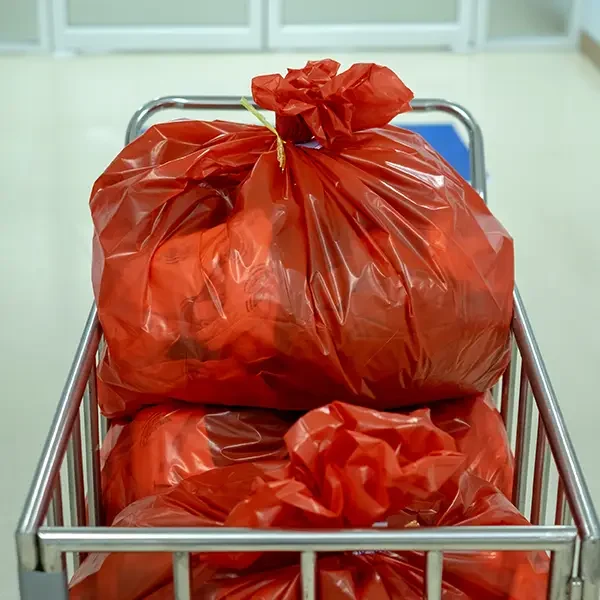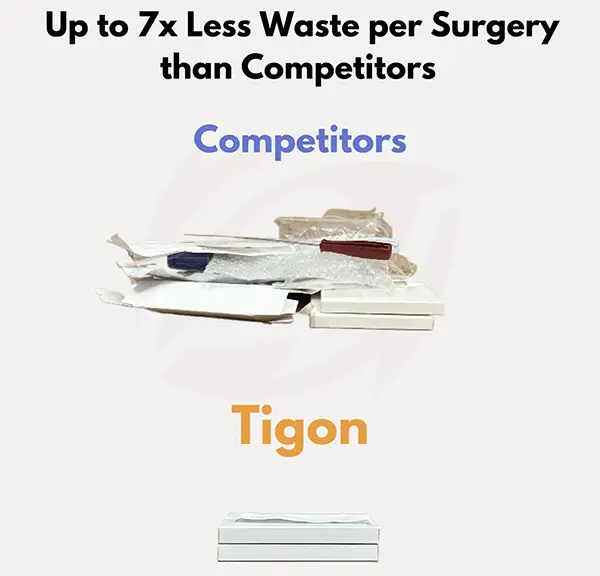How can hospital administration support sustainable healthcare?
Healthcare administrators that support sustainability initiatives or wish to improve the environmental responsibility of their organizations may wish to consider the ideas summarized on this page. We have compiled this list – based on current research – to help reduce healthcare waste and improve overall environmental sustainability. You can find more detailed information from our reference sources linked at the bottom of this page.

Tigon Medical encourages you to consider the following actionable ideas to improve healthcare sustainability:
Work to build sustainability into purchasing decisions
Specify and purchase environmentally friendly, reusable products that eliminate plastic waste. Products that replicate the Tigon GreenRepair® Platform.
Identify wasteful products and implement appropriate alternatives. Alternatives like Non- disposable instruments, reusable cannulas, and plastic waste reduction platforms.
Help divert waste from the landfill – look at incoming materials as a way to reduce waste before it arrives at the hospital
Encourage surgeon and nurse review of physician preference cards to find unused items.
Buy medical products with instrumentation that can be reused and that align with organizational sustainability goals.
Reduce power consumption
Buy from clean, renewable energy companies to reduce carbon footprint.
Generate your own electricity with rooftop solar panels.
Switch to LED lights that will reduce energy consumption.
Shut down HVAC systems during idle hours with timers or occupancy sensors.
Use lighting controls with occupancy sensors to switch off when not in use.
Turn off TVs in waiting rooms when unoccupied.
Consider saving power in ORs – turn off lighting, ventilation, anesthesia and other equipment during unoccupied hours.
Consider OR air exchange settings – is it set higher than requirements? (more cycles than required are not necessarily better and hurt energy efficiency).
Consider ultra-low temperature freezer settings and set to the appropriate level, not colder than needed.
Close chemical storage cabinet fume hoods when not in use to boost climate control efficiency.
Encourage biking, public transportation and car pools
- Provide bike racks and showers
- Discount parking for car pools
- Educate and incentivize staff - competitions help motivation

Reduce OR waste
Implement a policy for safe waste disposal methods as an alternative to incineration.
Decrease the amount of OR waste by creating a responsible culture among staff.
Reduce single-use plastic waste by increasing the recycle rate.
Properly classify general non-contaminated and hazardous regulated medical waste (RMW) to separate more efficiently.
Better identification and separation will facilitate recycling and waste reduction.
Improved separation will reduce significant amounts of non-contaminated waste incorrectly classified as hazardous – save expensive disposal costs and reduce pollution.
Single-use plastic items that have not come into contact with patients are general waste that can be recycled.
Close all RMW waste bins before patient enters OR to prevent general waste from being combined with expensive hazardous waste.
Discard blue wrap before patient enters OR so it can be recycled as general waste and converted back to polypropylene for reuse.
When possible, decrease the use of single-use plastics by choosing reusable alternatives for items such as surgical basins and sterilization wraps.
Consider replacing blue wrap with reusable sterilization containers that can be cleaned after use – Tigon GreenRepair® kits include a reusable metal box.
Reclaim opened, unused medical supplies and instruments that can be sent to less fortunate hospitals.
Donate surplus and obsolete medical supplies to disadvantaged health systems.
Anesthetic gases are greenhouse gases many times more harmful than carbon dioxide – minimize their release from closed loop anesthesia machines. "A recent study found that desflurane for 1 hour has the same environmental impact as driving 235 to 470 miles."

Reduce other healthcare waste
Use reduced plastic trash bags.
Use 100% compostable products made from plant starches – food waste caddy bags, patient belonging bags, and medical aprons.
Wash hands for simple tasks such as moving beds rather than using non-sterile gloves.
Consider a public free-cycle day to dispose of excess office supplies, unwanted furniture and equipment.
Reduce food waste
Use locally produced food and beverages to reduce greenhouse gasses associated with long distance transport.
Consider a rooftop garden to grow food.
Feed hungry people – donate excess food to local food banks.
Collect food waste to be composted if available.
